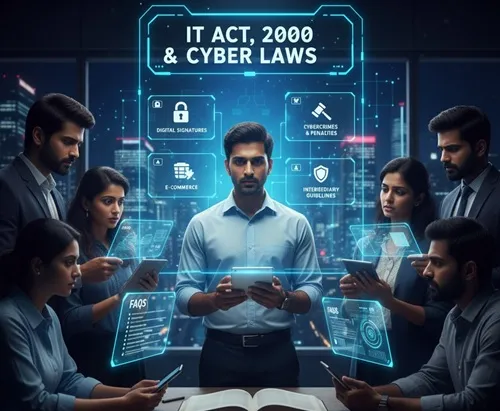
Legal Framework & Major Provisions
- The Information Technology Act, 2000 (IT Act) is the primary law for cyber law in India. It governs e-commerce, legal recognition of electronic records & signatures, cyber crimes, digital evidence.
- The Act is amended (notably in 2008) and supplemented by rules & notifications, e.g. Intermediary Guidelines & Digital Media Ethics Code Rules, 2021.
- It has extra recent updates: Jan Vishwas (Amendment of Provisions) Act, 2023, changes to adjudicating officer rules under IT Act, etc.
Important sections:
| Provision | What it does |
|---|---|
| Section 4 & 5 | Legal recognition of electronic records & digital signatures. |
| Controller of Certifying Authorities (CCA) | Regulates who issues digital signature certificates. |
| Section 43 | Civil liability for damage/deletion/unauthorised access, etc. |
| Sections 65-74 | Criminal offences: hacking, fraud via computers, identity theft, publishing obscene material, etc. |
| Section 69-related | Power to intercept, monitor or decrypt information for security, public order, etc. |
| Section 70 & 70A | Recognising "protected systems": critical information infrastructure protection. |
Some limitations of & key court decisions:
- Shreya Singhal v. Union of India (2015) struck down Section 66A (offensive/false messages) for being unconstitutional.
- Intermediary liability: safe harbour under Section 79, subject to compliance with rules.
FAQs
-
1. What is the main cyber law in India?
-
The Information Technology Act, 2000, with its amendments and rules like the Intermediary Guidelines, Digital Media Ethics Code, etc.
-
2. Are only online acts covered?
-
No. Any act using computers, networks, or electronic records is covered, even if not via the internet.
-
3. What kinds of cyber crimes are defined?
-
Examples: hacking, identity theft, fraud by personation, publishing obscene material, cyber terrorism, breach of privacy/confidentiality.
-
4. How is electronic evidence treated?
-
IT Act gives legal validity to electronic records and signatures. Courts accept them in proceedings.
-
5. What are the penalties for misuse of personal data/unauthorised access?
-
Depends on the section. Civil compensation may be ordered under Section 43. Criminal penalties under various sections.
-
6. Who is liable: individuals, companies, or intermediaries?
-
All. Intermediaries have certain protections (safe harbour) if they follow rules. If they fail, they lose protection.
-
7. Can foreign entities be liable?
-
Yes — if crime involves a computer system/network located in India.
-
8. How to report cyber crimes?
-
Via the Indian Cybercrime Coordination Centre (I4C), through the portal cybercrime.gov.in, or local police.
-
9. Are there state-wise variations in cyber law?
-
Cyber law is centrally legislated; states implement/enforce through police and local authorities. No separate state-cyber law for IT Act core provisions. Rules might differ in execution.
-
10. What recent amendments should one know?
-
Jan Vishwas (Amendment) Act, 2023 relating to IT Act amendments, IT Rules 2021 and subsequent amendment rules (e.g. 2023) for intermediaries, platforms, and content regulation.
Add new comment